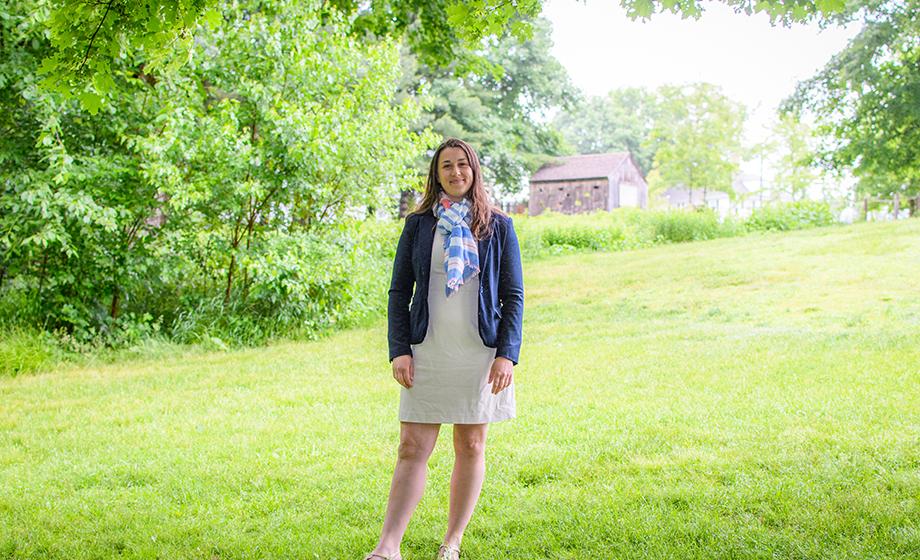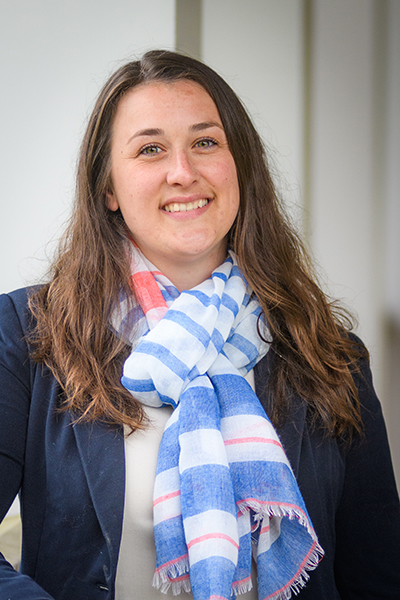
Severe storms. Flooding. Drought. Erosion. Devastated communities struggling to rebuild.
These doomsday headlines have become all too common, sweeping the news on a daily basis. In the face of climate change, communities are struggling with competing priorities and have difficulty focusing on climate resilience and conservation.
 The stakes are high.
The stakes are high.
On the front lines of outreach you’ll find Stefanie Covino, M.S./ES&P ’15. As coordinator of Mass Audubon’s award-winning Shaping the Future of Your Community program, Covino collaborates with partners throughout the state to advance community sustainability efforts. Her aim is to help communities understand how to reduce urban sprawl, improve climate resiliency, and plan for future climate impacts.
The first state in the nation to require a comprehensive statewide climate adaptation plan, Massachusetts finds itself in the vanguard of national efforts to address climate change. Covino partners with the Municipal Vulnerability Preparedness (MVP) grant program to help communities assess their needs and prioritize actions to reduce current and future threats. She has trained people in over 150 communities on MVP plans.
Covino uses education to nurture stewardship. Equipped with a series of customized workshops, she informs and empowers residents, public officials, and others throughout the “sprawl frontier” of Massachusetts. The sprawl frontier is the fastest-developing region of Massachusetts, including the I-495 corridor through the MetroWest, Central, and Southeast areas.
She preaches the use of “nature-based solutions” to stave off some of the insidious effects of climate change.
“From conserving open spaces that cool our cities to incorporating small-scale rain gardens that soak up the extra water climate change is bringing us, these solutions go back to basics and use nature to our — and its — advantage,” she says. By harnessing the power of nature, local impacts and costs are reduced and habitats are expanded.
“You can’t just come up with something and tell people what to do — you have to ask them what they need.”
Covino has been enthralled with preserving the natural world since she joined an environmental science club in the sixth grade. Throughout her life, she has volunteered with many local environmental groups, including the Greater Worcester Land Trust. After earning an anthropology degree from Goucher College, she explored a variety of job opportunities (manual labor on a submarine included). Ultimately, Covino determined that she needed advanced academic credentials to secure a full-time position in the field.
The International Development, Community, and Environment (IDCE) Department’s interdisciplinary approach armed Covino with the skill set necessary to excel. “I talk about stormwater management, low-impact development, water resource management, water quality, climate change, urban heat island effect, local regulations, conservation plans. I often include all of these subjects within a five-minute conversation, so it requires an understanding of a lot of different topics and how to synthesize them,” she says. Once Covino decided upon Clark’s Environmental Science & Policy (ES&P) master’s program, she discovered her passion for environmental advocacy.
In the classroom, Covino learned the power of collaboration, clear communication, and stakeholder engagement. “You can’t just come up with something and tell people what to do — you have to ask them what they need,” she notes. “You need to know who knows what and how to partner with others so we each can focus on our own skills and be the most effective we can in creating change.” She says this approach has allowed her to become a leader who can inspire and educate the public.
While studying at Clark, Covino also had the opportunity to work on a water-contamination research project under the guidance of Timothy J. Downs, associate professor of environmental science and policy. Concerned residents in Holliston, Massachusetts suspect that unexplained health issues, including chromosomal and kidney abnormalities, have been caused by a contaminated water supply. The four-year study, a collaboration between Clark and Boston University, examined the vulnerability of the Holliston water supply to pollutants from nearby industries. The findings were published as a journal article in Water last December. Covino is one of 16 co-authors who contributed to the study (see related story).
Their findings have recently garnered widespread local and regional media attention.
Covino is optimistic that exposing the contaminants lurking within the Holliston community’s drinking water will compel change. “The hope is simply that we can know what happened and how, so that we can make sure these negative health effects won’t happen to someone else living in a vulnerable area,” she says.
By creating knowledgeable citizens, Covino crafts empowered communities.
“It often sounds very theoretical,” Covino says. “But, we take action and go out directly to communities. If they tell us they have flooding downtown, we work through how we can reduce that flooding (hopefully through a nature-based solution like bioretention) and protect people’s homes and livelihoods. It’s on-the-ground work that’s affecting people day to day.”


